- Home
- L. R. Patton
The Dragons of Morad Page 7
The Dragons of Morad Read online
Page 7
“I saw something,” Arthur says.
“You saw them?” Maude says.
“No,” Arthur says. “Just a gleam of something. The moon is gone.”
“Might they have seen you?” Maude says.
“No,” Arthur says. “It is too dark.”
They do not speak for some time, both thinking about the trap in which they have stepped.
“I heard the ground shake,” Maude says. “Earlier this eve.”
“As did I,” Arthur says. He had thought the shaking meant dragons, but nothing showed itself, and so he had chalked it up to his own imagination.
“I should have taken the children and followed you,” Maude says.
“You did not know,” Arthur says. He pulls Maude toward him. She lays her head on his shoulder.
“Whatever will we do, Arthur?” Maude says, for the hopelessness has climbed from the back of her throat out into words. And Arthur, alas, cannot say, for it matters not when they choose to leave, they will be spotted by the king’s men.
“We must risk it,” Arthur says. “We must leave here as soon as we can.”
“They will see us,” Maude says. “We will not be able to escape.”
“Perhaps there is still hope,” Arthur says. “Perhaps there are still dragons.”
Maude pulls away and studies Arthur’s face, though it is far too dark to see. “Dragons? Yet another danger.”
“Perhaps,” Arthur says. “Perhaps not.”
Maude narrows her eyes, though the narrowing is lost on Arthur. “What would you know of dragons that leads you to believe they are no danger?” she says.
“I studied dragons for a time,” Arthur says, closing his eyes. “I knew them quite well.”
Maude knows that Arthur is tired, so she lets it go at that. But there is one more thing she must say, and it is this: “We should have left as soon as we arrived here.”
“Perhaps,” Arthur says. “One cannot always tell the future.” He rubs Maude’s arm. “When one is not a prophet.”
Why is it that Maude and Arthur never became prophets in their time? For the ability is offered to all sorcerers, just before their first child receives the gift of magic. Well, dear reader, we must not get ahead of ourselves. That is a story for another time. For now, we must note that both Arthur and Maude regret, if only for a moment, that they did not agree to the terms.
“If only,” Maude says.
Arthur takes her hand once more. “We cannot dwell on what is already done, only on what must be done,” he says. Arthur is a wise man, would you not agree? Of course one should not dwell on what is already done, for not a thing can be done to change it. We are only permitted to change the future.
Maude nods her head, but, in truth, she is thinking, even now, about Fairendale and its loveliness, the home she shared with Theo and Hazel and Arthur, the friends who gathered in the streets every eve to watch the sun’s setting. She misses her home. She misses her friends. She misses her son.
“We shall leave in the early morn,” Arthur says now.
“But the king’s men will surely see us,” Maude says.
Arthur nods. “Yes,” he says. “They will see us.”
Maude waits for him to speak, and when he does not, because he has fallen asleep in the middle of a thought, she says, “So we will be captured.”
“No,” Arthur says. “The king’s men will not cross into the lands.”
“You cannot be sure of that,” Maude says.
“No,” Arthur says again. “But I hope.”
And so Maude, who is not so easily given to optimism, chooses to hope as well.
They drift off to sleep together, sitting with their backs against the cave walls, their heads propped against one another, waiting for the morning’s first light.
Opportunity
CORA’S father never moved. Months passed. Cora turned eight, then nine, then ten, then fifteen. Every morning her father would walk to the castle before she woke and return after she had gone to bed. She hardly saw him anymore.
One night, though, she stayed up late to see him, just for a moment.
He walked into their home and startled. “Cora,” he said. “I did not expect to see you.”
“What is it, Father?” she said. “What is it that keeps you so long at the castle?” She pulled out her father’s chair, where a bowl of soup had grown cold. He sat and picked up his spoon.
“Thank you, my dear, for cooking,” he said. He looked up at her, and his eyes were so very sad that she could not bear to see. She turned away while he said, “I should be cooking.”
She waited for him to eat what little there was, and then she asked her question again.
“The king,” her father said. “He has demanded more hours and more responsibilities. I have only just finished.”
“What responsibilities?” Cora said.
“Securing the food,” her father said. “The king must ensure that no food leaves the castle.”
“But no one from the castle even comes to the village anymore,” Cora said. “Not since King Wendell was banished.”
Her father raised his eyes to hers again. “I do,” he said, and the words held a thousand regrets.
“But you do not bring food,” Cora said. “Do you, Father?”
Her father did not answer. He stared at his soup, which was only broth now.
“What do they do with all the extra food, Father?” Cora said.
“It is time for sleep,” her father said, rising from his chair. “I am very tired.”
“But what do they do with it?” Cora said.
Her father shook his head. “Must you know?”
“Yes,” Cora said. “I will not let you rest until I know.” She smiled, but her father did not smile back at her.
“They dump it,” he said. “In a heap pile beyond the castle.”
“Where we might collect it?” Cora said. An idea warmed her chest. There might yet be a way.
Her father shook his head again. “No,” he said. “There are guards. Many of them. You would never make it out alive.”
But she would. She knew a way, you see. And so one night she tried. She slipped into her feathers and flew in the dark of night with the biggest basket she could carry in her beak. She landed on a wall and watched the guards, memorizing their movements. And then she made her move.
She filled up the basket as quickly as she could, and then she disappeared. She dropped the offerings at the doors of the people, and, come morning, they were gone.
Over time, she grew stronger and was able to carry a larger basket. Back and forth, back and forth she flew. Before long, the people had called the feast waiting at their doors a miracle of the most magical kind.
Until, one night, she was discovered.
It was a new guard, who did not keep the same rhythm as the others. She had been careless, not wasting precious time to watch where he walked.
“Hey,” the guard said, as if he knew exactly what she was. “Shoo.” It took him a moment to notice the basket in her beak. She took to the sky before he could reach her, but she knew that he had seen what mattered most.
The next evening there were six guards, one on each side, stationed there, and two who roamed, and she flew over the great heap and did not stop. The people had no leftover roast lamb the following day. And the next evening was the same. And the eve after that, the king stood waiting.
“There,” a guard said. “There it is.” He pointed to the sky, to her.
“Blackbirds do not venture this close to humans,” the king said, “It is no place for them.”
“Perhaps it is hungry,” another guard said.
The king squinted up at her. She saw her chance. She made her calculations. And then she dove.
The king’s scream was heard all the way back in the village of Fairendale. It took only seconds to gouge out his eyes, and then he was writhing on the ground, and the men knelt beside the king and tried to staunch the blood, but she had al
ready taken flight. They looked up at the sky, and then they looked back at their king, with no eyes and a blood-stained face, and they drew their weapons, for they knew then that this was no ordinary blackbird. They chased Cora as long as they dared, but she flew into the Weeping Woods, and they did not follow.
Cora, though, did not return home. She saw another opportunity, for she had drawn the king’s men far away from the side of the one they had sworn to protect, and so she returned for one last attack.
Her hate, you see, had become dark and sinister, and the kingdom, in her eyes, was better off without a man such as this one ruling it.
When she took flight again, she did not know if she finished the job. But she returned to her father’s house and waited for him to return as well.
He came hours later. She was still up waiting, sitting by the fire, staring into it.
“Cora,” her father said. “My dear, it is very late.”
“I could not sleep,” she said.
Her father looked at her. His eyes were sad. “The king,” he said. “He was attacked tonight.”
Why would her father feel sad about a man like the king getting what he most deserved? Cora felt only relief.
“Attacked?” Cora said, though the only question she wanted to ask was whether or not he was alive.
“Yes,” her father said. “By a blackbird.” He looked at his daughter long and hard. He did not know about her shape shifting. No one did. This was a secret Cora had kept from the world, though if her mother had been alive, she would have guessed, for Cora’s mother had been a shape shifter in her time.
“How very strange,” Cora said. A hardness crept into her voice. “And does he live?”
“Yes,” her father said. “Barely.”
So she had not finished the job. She felt the disappointment of regret.
“The healer says he will not live the morrow,” Cora’s father said.
“How very sad,” Cora said.
Her father still gazed at her. Perhaps he had guessed. “A blackbird,” he said. “A blackbird who pecked out the eyes of the king and left him to die.” He knew about her mother. He had seen her transform once. He had never asked about it, but he had known.
“If he dies,” Cora said. “What will happen?”
Her father drew a long breath and then let it loose. The fire flickered on his face. She noticed new wrinkles. He looked much older than he used to.
“Prince Willis will take over,” her father said. “And we hope for better.” He rose and kissed the top of her head and then disappeared into the room he used to share with her mother.
Cora remained staring at the fire until just before dawn.
Found
IT is morning. They have survived the night. They are alive. The king’s men look around at one another. They count. They count again. They count once more, and not a one of them has been lost. They let loose a raucous cheer, and in the stillness of early morning, it is thunderous.
“It must have been the boundary line,” Sir Greyson says. “Perhaps no harm can come to us on the boundary line.” The captain feels good enough to grin at all his men, but, then, what kind of captain grins at his men? So he pulls his helmet over his head so they cannot see the joy in his eyes or the way it stretches across his face. He looks through the slit of his steel, toward the dragon lands. This will be no way to watch. He will have to remove the helmet, but, for now, he keeps the helmet low, his face hidden. No sense in riling up his men with false hope. They do not yet know if they will find anything, least of all the missing children.
But they have survived the night. This is enough hope on its own.
Sir Greyson and his men watch and wait, all four hundred eyes trained toward the wide expanse of dragon lands, looking for a sign that something lives there. The sun is hidden this early morning, so the land stretches before them, bathed in a harsh grey that makes it difficult to see into the distance. But with so many eyes trained on the land, it would be impossible for so many to escape without being discovered, and so Sir Greyson and his men continue their waiting and watching. They hardly dare to blink.
“They will not hide for long,” Sir Merrick says. “They will have to search for food. No one can survive without food.”
The words send a sharp pain to Sir Greyson’s stomach. His men have not been eating as they should. Truth be told, they stand, but they are weak on their feet. They did not bring adequate supplies to camp, and even now, they are longing for the castle grounds, where at least they could pull from the royal garden and fish in the tributary.
“Yes,” Sir Greyson says, though his voice is quiet and muffled behind his helmet. “Yes, we will find them soon.”
And then, just as the sky lightens to a softer gray, there is movement from a cave in the center of the dragon lands, and one of the men, who was looking that way quite by accident, for he did not think one would travel so far into the dragon lands and live, sees it. It was the head of a man, he is sure. And there it is again, scanning the land. The soldier cries out. He points.
“There!” he says. “There is a man!”
Not one of them knows whether this one man means anything at all, but you must understand that, after so long searching, anything is something. The man appears not to see the king’s men and, in their plain view, steps out of the cave. He is alone. He stands alone. He faces them, and they are, for once, glad there is no sun, for they are sure that their armor blends in with the sky. And perhaps it would, dear reader, if they had been standing against the sky. But they are standing against the backdrop of a forest, green everywhere, and so their silver armor stands out most obviously. Still the man remains, turned toward them. Still the man beckons behind him. Still the children come tumbling out.
“What is that?” a man shouts.
“It appears to be children,” Sir Greyson says. “A multitude of children.”
The men give another cheer, for they know this means, finally, miraculously, an end to their quest and a return to their homes. They have waited so very long for this day, and even Sir Greyson cannot help lifting up a shout of relief.
Finally. Finally they have found that for which they had searched.
Their cheer races across the land, as if it has wings. The trees behind them shake in their own silent cheer. Even the sun, for a moment, bursts through its clouds, disappearing as suddenly as it appeared.
It is as if every moment has led them here.
Sir Greyson cannot help but cry.
ARTHUR stops mid-step. The cheer has reached his ears. He turns toward the sound. He, of course, knew they were there, but he supposed they would not try to cross the land. And, indeed, the king’s men remain where they are, as they are. A whole line of men stands still, like the trees behind them, holding the reins of their horses.
“There,” he says. “See, children? Nothing to be afraid of.”
At the sound of his voice, Maude and the children turn around. They see what Arthur has seen, and all of them give a gasp in the same collective breath, for they do not see nothing to be afraid of at all. They see the king’s men, come to round them up once more. They see dungeons and darkness and danger. They taste fear. What will they do now? If they run, the dragons might sense their heavier foot falls. And yet, the king’s men are right behind them.
“Tell them,” Maude says, sensing the children’s fear. They cannot, in truth, move. They simply stare at the line of men before them.
“They will not cross the boundary,” Arthur says. “They will not risk it.” He nods toward the men. “You see? They have not moved.”
“How far until we reach the end of these dragon lands?” Hazel says. It is a whisper, for though her father has assured them the king’s men would not dare cross the boundary line, she cannot feel so sure.
“Three days’ journey, at least,” Arthur says, for he knows his daughter. He knows her worries, but he tries to remain calm himself. “We must walk, not run. We must take what caution we can.”
“They will not cross,” Arthur says. And, indeed, the king’s men have not yet crossed, still. They would have crossed if they wanted. Arthur’s mind moves to what he knows of the dragon lands. They will have to take a straight shot, rather than walk the perimeter, for it would not take nearly so long to cut directly across Morad.
Arthur looks behind him, toward the way they must go. Surely, if the dragons still lived, they would have shown themselves by now. He looks back toward the men. The better way, the less dangerous way, would be to surrender to the king’s men. They would hatch a plan of escape then. But the dragons would leave no survivors, should there be any left. It is a great risk.
What seals the decision for him is the rumbling of a child’s belly. He knows that the children are not strong enough to escape from the king’s guard. They would have to risk. They would have to venture forward.
Hazel gasps. The king’s men have moved. They have climbed onto their horses. They look as though they are ready to cross the boundary line.
“Father,” she says. Her voice holds all the fears a girl could ever carry.
“Arthur?” Maude says. “We must do something.”
“What must we do, Father?” Hazel says. “They are coming. They will cross.”
“Run?” Maude says. She looks at her husband, but he does not meet her eye. In the distance, the king’s men wait on their commander’s order.
“Run,” Arthur says.
But before they can even put one foot in front of the other, the whole land gives a violent shake. Once, twice, a thousand times. Arthur stares at his feet, and then, slowly, slowly, slowly he turns around.
He does not need to look to know what he will find.
SIR Greyson watches them watch his men. He wonders why they do not run. He wonders why he does not order his men to attack. He wonders why the whole world holds still, as if they are all frozen into this scene of relief and, on the part of the children and the man, fear.

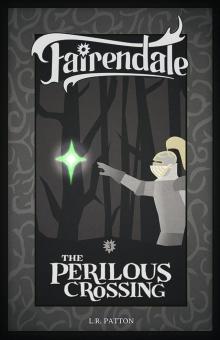 The Perilous Crossing
The Perilous Crossing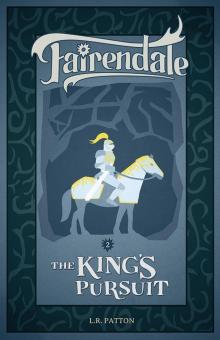 The King's Pursuit
The King's Pursuit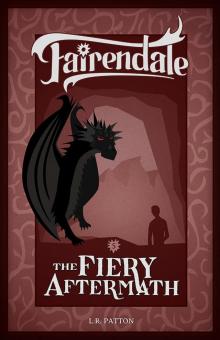 The Fiery Aftermath
The Fiery Aftermath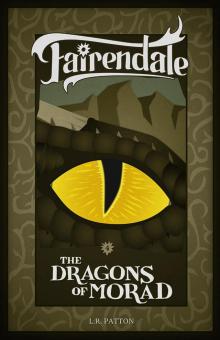 The Dragons of Morad
The Dragons of Morad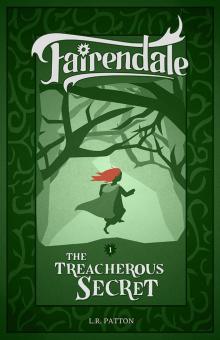 The Treacherous Secret
The Treacherous Secret